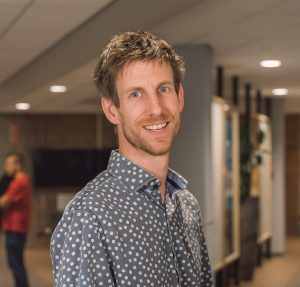Bionote

Ard Westerveld received a MSc degree Biomedical Engineering in 2009 from the University of Twente in Enschede, The Netherlands. In 2014 he obtained his PhD in the field of rehabilitation robotics from the same university. During his PhD research, he developed control algorithms for both functional electrical stimulation systems and robotic manipulators for arm assistance in the context of the MIAS-Active Therapeutic Device project aiming at functional therapeutic training of stroke survivors. From 2014 until 2021 he worked in a mechatronical engineering company, mainly focusing on the design and realization of computer vision systems in industrial applications. Since 2021 he is working as a researcher in the SMART Mechatronics and RoboTics research group of Saxion University of Applied Sciences in Enschede, The Netherlands. Within this group Ard focuses on control and manipulation of robotics, with a special interest in unstructured environments like agriculture.
Presentation Abstract
At the SMART Mechatronics and RoboTics research group of Saxion University of Applied Sciences in Enschede (The Netherlands) we have many different application areas for our projects. One of these areas is robotics for (precision) agriculture. In this domain several projects are ongoing, both in greenhouses and open field. Recently, we completed a project to remove weeds close to field crops. In this project an effective tool for weed removal based on heat conduction was developed together with a positioning module and methods to compensate for vehicle motions. Because a modular approach was taken, the solution was integrated into an existing field robot at the end of the project. For future research we aim to further generalize this concept into modular building blocks with standardized interfaces and make both hardware and software open source available in a way that end users can use the solution in their daily agricultural practice.
Co-Authors: M. Reiling, R. Meijering